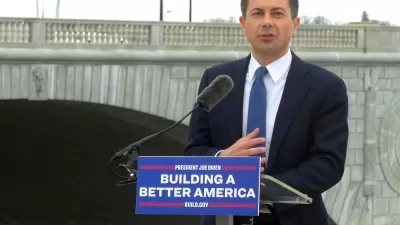Some skepticism is warranted about the potential impact of a proposed federal rule for states and regional planning agencies to track greenhouse gas reductions from transportation investment.

The U.S. Department of Transportation’s Federal Highway Administration (FHWA) announced a Notice of Proposed Rulemaking (NPRM) for states and municipalities to track and reduce greenhouse gas (GHG) emissions,” according to a press release published on the FHWA website on July 7.
The proposed rule would piggyback on the $27 billion in federal funding from the Infrastructure Investment and Jobs Act (IIJA) to help state departments of transportation (DOTs) and metropolitan planning organizations (MPOs) meet GHG reduction targets.
The specifics of the proposed rule are twofold, according to the press release:
- Establish a national framework for tracking state-by-state progress by adding a new GHG performance management measure to the existing FHWA national performance measures to help states track performance and make more informed investment decisions.
- Create a flexible system under which State DOTs and MPOs would set their own declining targets for on-road greenhouse gas emissions from roadway travel on the National Highway System.
The press release also lists programs funded by the IIJA intended to reduce emissions, including the Carbon Reduction Program, the National Electric Vehicle Infrastructure (NEVI) Formula Program, the Discretionary Grant Program for Charging and Fueling Infrastructure, Congestion Relief Program, Reduction of Truck Emissions at Port Facilities Program, Low or No Emission Vehicle Program, Transportation Alternatives Set-Aside, and the Transit Oriented Development (TOD) Program. Some of these programs are likely to be more effective than others at reducing emissions rather than scoring public relations points.
“This is a vital first step, but there is still more the administration can and should do. We urge the USDOT to be bold and consider state progress on these new emissions goals when awarding discretionary grant funding, particularly for projects related to emissions reduction like the Carbon Reduction Program,” said Beth Osborne, director of the Transportation for America advocacy organization, in response to the proposed rule.
Corinne Kisner, executive director of the National Association of City Transportation Officials (NACTO), and Janette Sadik-Khan, chair of NACTO, also released a statement praising the Biden administration for the proposed rule. “We can’t change what we don’t measure,” said Janette Sadik-Khan.
As noted in the FHWA press release, transportation is currently the largest source of emissions in the United States.
Despite the obvious negative externalities of automobile dependency, most states prefer car-centric infrastructure investments. The proposed rule was announced, for example, the same week that Arizona Governor Doug Ducey vetoed a proposed ballot initiative in Maricopa County that would have extended the Proposition 400 transportation sales tax to fund 350 new freeway and highway lane miles, including 186 new HOV lane miles, and 1,300 new or improved arterial road lanes. Gov. Ducey vetoed the initiative due to concerns about raising taxes during a period of intense inflation—not out of concern for greenhouse gas emissions in a region facing intense climate risks.

Planetizen Federal Action Tracker
A weekly monitor of how Trump’s orders and actions are impacting planners and planning in America.

Restaurant Patios Were a Pandemic Win — Why Were They so Hard to Keep?
Social distancing requirements and changes in travel patterns prompted cities to pilot new uses for street and sidewalk space. Then it got complicated.

Map: Where Senate Republicans Want to Sell Your Public Lands
For public land advocates, the Senate Republicans’ proposal to sell millions of acres of public land in the West is “the biggest fight of their careers.”

Maui's Vacation Rental Debate Turns Ugly
Verbal attacks, misinformation campaigns and fistfights plague a high-stakes debate to convert thousands of vacation rentals into long-term housing.

San Francisco Suspends Traffic Calming Amidst Record Deaths
Citing “a challenging fiscal landscape,” the city will cease the program on the heels of 42 traffic deaths, including 24 pedestrians.

California Homeless Arrests, Citations Spike After Ruling
An investigation reveals that anti-homeless actions increased up to 500% after Grants Pass v. Johnson — even in cities claiming no policy change.
Urban Design for Planners 1: Software Tools
This six-course series explores essential urban design concepts using open source software and equips planners with the tools they need to participate fully in the urban design process.
Planning for Universal Design
Learn the tools for implementing Universal Design in planning regulations.
Heyer Gruel & Associates PA
JM Goldson LLC
Custer County Colorado
City of Camden Redevelopment Agency
City of Astoria
Transportation Research & Education Center (TREC) at Portland State University
Camden Redevelopment Agency
City of Claremont
Municipality of Princeton (NJ)





























